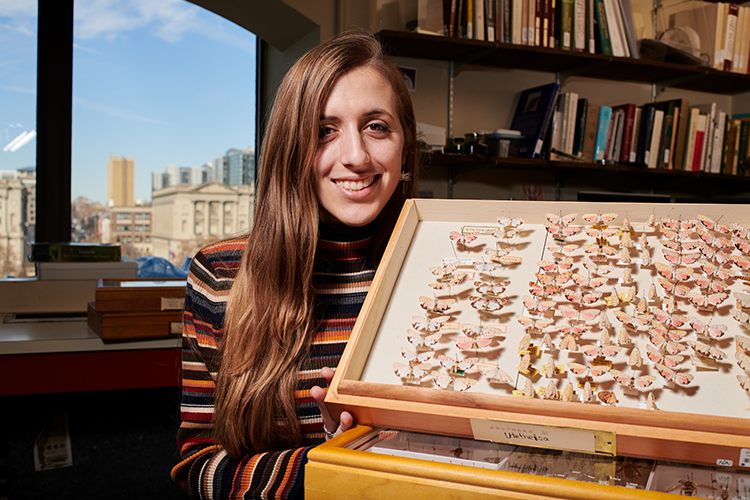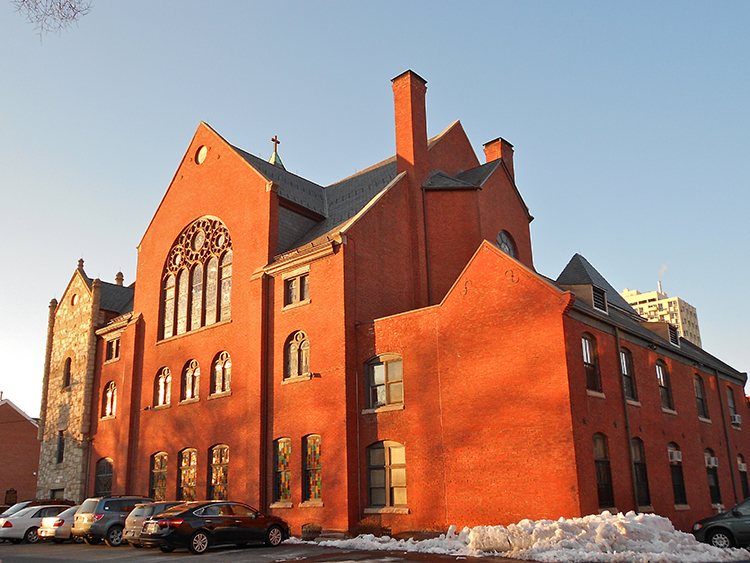Today bike messenger Joe Cox spends his days riding the streets of Philadelphia. But tomorrow? He just might be running them.
The pink-mohawk-sporting 32-year-old announced his campaign for a seat on Philadelphia City Council At-Large last year. He’s made himself known by protesting the city’s now defunct data-sharing agreement with Immigration and Customs Enforcement (ICE) and for founding the twice monthly “Positive Mental Attitude” (PMA) campaign, wherein he rides around the city giving pizza to the homeless and the hungry.
We caught up with Cox in February to learn a little more about his campaign promises and how he thinks he can make Philadelphia a safer space for bikers. This interview has been edited for clarity and style.
You’ve been doing PMA Bike Ride for more than two years now. Can you tell us why you started it? I ride around Philadelphia all day and I see many people that are down on their luck. I saw a problem, and I wanted to do something, so I started the PMA Bike Ride. The idea was, instead of talking about it, we should do something about it. There is no reason anyone should be hungry in America. We should do everything we can to “be the change,” which is a phrase I try to live by.
Tell me why you decided to run for city council. Because of my years of activism, I’ve had many people ask me if I was going to run for office. As a bike courier, I talk to dozens of working class people every day and have gotten to know some of them pretty well. One thing I hear a lot is that despite all of the growth, development and investment coming to Philly, quality of life has not improved. It’s hard to disagree, when Philadelphia was named the poorest big city in the country.
More recently, I was part of the Abolish ICE coalition group, and after all of our hard work and sacrifice, we forced Mayor Kenney to end the PARS [Preliminary Arraignment Reporting System] agreement.
During our organized occupation of the Philadelphia ICE office, I remember someone walking by, asking if one of us was going to run for office in Philly and how we should if we want to change things. After that, I asked my friends what they thought about me running. So many people that don’t believe in voting told me they would vote for me—that is the main reason why I made the decision.
As a cyclist, what’s your take on Philly’s street conditions? Our streets are deadly, and it’s disgusting that our city allows such conditions. Riding around Philly is like an adventure course. Worse than the roads, a lot of times, is the toxic car culture in Philadelphia. Drivers are very aggressive, and I have almost been killed. Sometimes it seems intentional. The state of our roads is a real public health problem.
What needs to be done to fix our bicycle infrastructure? We need to make sure that anyone with a license knows you are required to pass a cyclist from at least a four-foot distance. It needs to be on the tests to get a license. There should be signs throughout Philadelphia that promote the four-foot law, possibly even have it written on the road all over, like a sharrow [shared-lane marking]. Every road should have a bike lane. The bike lanes we have now need to actually be bike lanes. They need to be enforced. If there are cars in the bike lane, they need to be removed. Philly has more people biking than any other big city, and cyclists should feel protected. We need to vastly expand protected bike lanes.
Pedestrians often don’t feel safe in Philly, either. What do you think the council can do to make streets safer for those of us who walk to work? Pedestrian safety is yet another thing in Philadelphia that lacks equity. Everyone who lives in Philly knows that Roosevelt Boulevard is one of the most dangerous roads in the U.S. for pedestrians. As a city, we should be declaring this a state of emergency. City council could set up a task force with the sole purpose of making our streets safer. Better bike infrastructure would make pedestrians also much safer.
Are there any outside-the-box transportation options or transportation ideas you would support to make streets safer and the environment cleaner? We need more loading zones. I would love to get rid of a lot of parking to open up those zones. I would support a car ban of some sort. Something like only loading vehicles, shared vehicles, public transit vehicles, any vehicles for handicapped and emergency vehicles. Public transit should be free for low-income people. Any person going to college in Philadelphia should have free public transit, too. For now we need to push for free transfers and better access to the SEPTA Key in low-income neighborhoods. We should put solar panels on our own buildings. City Hall should be run by renewable energy and so should every city building. The city is very windy—with my signs, I can tell you that. We should be taking advantage of that wind.
Can you explain the significance of some of the signs you’ve strapped to your bike over the years? I started putting signs on my bike during the 2016 election. My first sign was “Bernie marched with MLK. He stands for equality!” Bernie [Sanders] inspired me to get more involved politically. The first PMA Bike Ride was a week before the Democratic National Convention.
The PMA Bike Ride sign has always been: “Make a stranger smile. Be the change.” Most people—no matter what—smile when they see it. But the sign generally refers to people living on the street. For instance, if you see someone on the corner with a sign, you can make them smile. You can do this by telling them a joke sometimes or just by saying hi or giving them some food or a few bucks. But generally the sign means: spread love, open the door for your neighbor, do good to do good.





